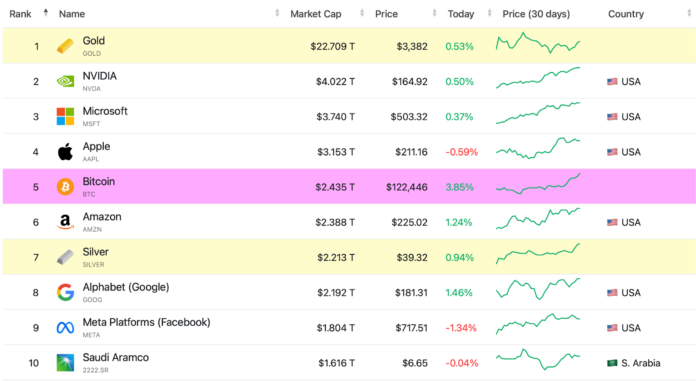14 Jul Bitfinex Alpha | Bitcoin Will get Re-Priced as It Surges to New ATH
Bitcoin has surged to a brand new ATH, breaking out of its extended consolidation between $100,000 and $110,000 to succeed in $123,120—marking an explosive 12.2 p.c transfer past January’s peak and a 65 p.c rally from the April lows. This transfer was powered by short-term holders aggressively bidding. Bitcoin’s sharp rebound from the tariff-induced April panic has firmly reasserted its standing as a macro-resilient asset, outperforming conventional hedges like gold and equities. In a market grappling with international uncertainty, Bitcoin’s distinctive positioning as a high-beta secure haven is more and more validated.
Now the fifth-largest asset on the planet with a $2.43 trillion market cap, Bitcoin has surpassed each silver and Amazon, by way of market valuation. ETF-driven demand continues to dominate, with US spot Bitcoin ETFs recording over $2.7 billion in inflows final week, considerably outpacing the mined provide of BTC final week — with BlackRock’s IBIT ETF reaching $80 billion in AUM sooner than any ETF in historical past. In the meantime, grassroots accumulation by pockets cohorts below 100 BTC can be outpacing new issuance by a large margin, decreasing additional provide stress.
Bitcoin’s position as a digitally native financial asset, validated by sovereign-grade allocators and steadiness sheet buyers, is driving its ascent by the worldwide asset rankings. The worth motion displays extra than simply momentum, it represents a elementary repricing of Bitcoin’s position in institutional portfolios and macro frameworks. And whereas headline financial indicators additionally recommend broader stability within the US, a better examination reveals deepening cracks beneath the floor. Labour market dynamics are weakening, with rising persevering with jobless claims pointing to challenges in workforce reintegration, particularly in entry-level roles.
Concurrently, client sentiment is cautiously optimistic however weighed down by persistent structural strains—elevated credit score prices, important dwelling bills, and rising geopolitical uncertainty are testing family resilience. On Primary Road, small companies are feeling the pinch. Regardless of steady readings in enterprise surveys, information reveals that many corporations are grappling with sluggish gross sales, rising enter prices, and hiring mismatches, forcing them to reduce investments and hiring plans. In the meantime, Wall Road is exhibiting its personal indicators of fragility, with a depreciating greenback, rising Treasury yields, and widening credit score spreads reflecting heightened investor nervousness and scepticism towards US fiscal and financial coverage.
Amid this backdrop of macroeconomic uncertainty, the digital asset sector is gaining momentum. BioSig, a Nasdaq-listed agency, has secured as much as $1.1 billion in financing to spearhead its push into tokenised commodities, following its merger with blockchain agency Streamex. The capital will underpin the creation of a blockchain-based tokenised treasury—beginning with gold-backed merchandise—positioning BioSig to capitalise on rising demand for real-world asset tokenisation. Equally, Tether, the issuer of USDt, has bolstered its compliance capabilities by investing in blockchain analytics agency Crystal Intelligence. This transfer enhances Tether’s capability to detect and reply to illicit exercise, reinforcing its dedication to transparency amid a surge in crypto-related fraud. Globally, governments are additionally signalling elevated assist for digital asset innovation. South Korea has proposed reclassifying crypto companies as “enterprise corporations,” making them eligible for tax incentives, public funding, and startup packages. This coverage shift, aligned with President Lee Jae-myung’s broader pro-crypto agenda, marks a major step towards institutionalising digital property throughout the nation’s tech and monetary panorama.

